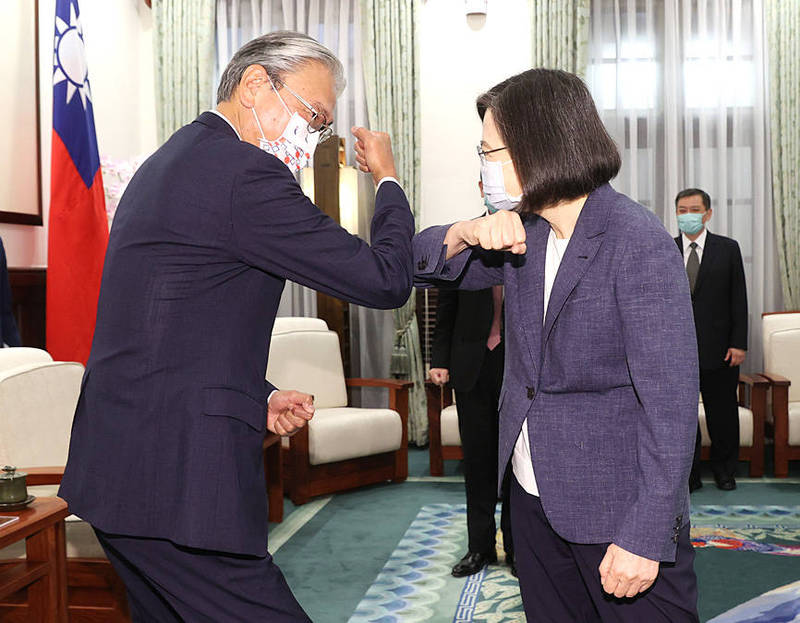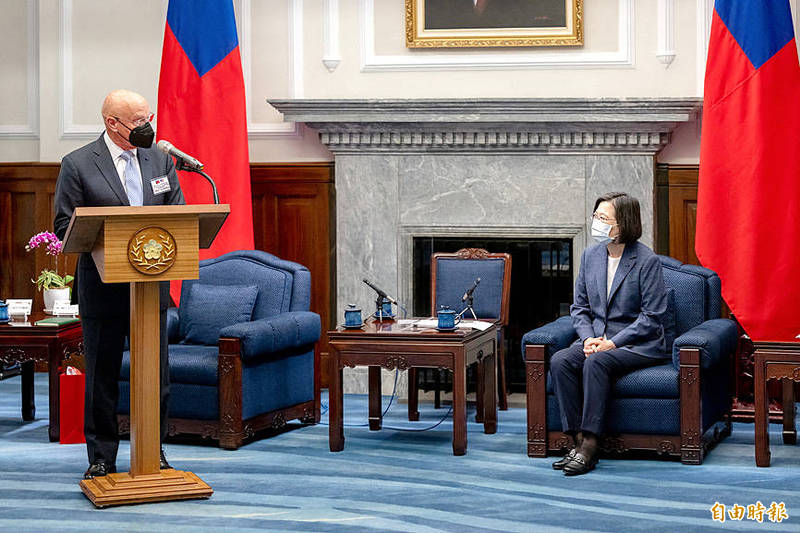《TAIPEI TIMES》 Tsai urges stronger democratic alliance

President Tsai Ing-wen, right, bumps elbows with Japanese Representative Keiji Furuya at the Presidential Office in Taipei yesterday. Photo: CNA
‘RIGHT TO EXIST’: Taiwan’s status as one of the most liberal nations in the world is a major reason for it enjoying such admiration in the US, a former US admiral said
By Shelley Shan / Staff reporter
Democratic partners should strengthen their alliance to defend against interference by authoritarian states, and protect regional peace and stability, President Tsai Ing-wen (蔡英文) told delegations from Stanford University’s Hoover Institution and the Japan-Republic of China Diet Members’ Consultative Council yesterday.
“China’s recent military exercises in areas surrounding Taiwan have posed significant threats to the status quo across the Taiwan Strait and throughout the region,” Tsai said during a meeting with a research team from the Hoover Institution at the Presidential Office.
“Russia’s invasion of Ukraine this year has highlighted the continuing expansion of authoritarianism. Yet, in standing up to fight for and defend their homeland, the people of Ukraine ... have shown the necessity to safeguard one’s freedom and democracy,” she said.
As Taiwan yesterday observed the 64th anniversary of the start of an artillery battle with China that marked the beginning of the Second Taiwan Strait Crisis, Tsai told the US delegation that soldiers and civilians operated in solidarity and defended Taiwan during the crisis.
Thanks to them, Taiwanese now have today’s democratic Taiwan, she said.
“The battle to protect our homeland showed the world that no threat of any kind could shake Taiwanese’s resolve to defend their nation, not in the past, not now and not in the future,” she said.
“We too will show the world that Taiwanese have both the resolve and the confidence to defend peace, security, freedom and prosperity,” Tsai said.
“With autocracy continuing to make inroads around the globe, Taiwan and the US should work together to build safer and more resilient supply chains. This is one of our key priorities,” she said.
At a separate meeting with the Japanese delegation representing more than 260 lawmakers in the council, Tsai reiterated the importance of deepening cooperation with democratic partners.
“Taiwan and Japan have over the years formed close ties through suffering and hardship. The friendship and values that the two countries share would only be reaffirmed through more and greater challenges ahead,” she said.
Retired US admiral James Ellis, who led the US delegation, said escalating threats to peace and stability for Taiwanese and the Indo-Pacific region, as well as growing challenges to the security of the semiconductor and other supply chains, are causes for concern.
“Now more than ever, we believe it is important for individuals and institutions in the US and other countries to demonstrate support for Taiwan’s right to exist as a self-governing democracy to cooperate with its vibrant private enterprises, particularly in the high-tech sector, and to maintain close connection to and solidarity with Taiwan’s creative and freedom-loving people,” Ellis said.
Taiwan’s hard-won status as one of the most liberal democracies of the post-Cold War world is a major reason it enjoys such admiration, as well as broad and deep support in the US and elsewhere, Ellis said.
The delegation’s visit aims to reaffirm the commitment of Americans to bolstering Taiwan’s self-defense capabilities, which is consistent with the US’ Taiwan Relations Act, Ellis said.
“Effective self-defense involves more than purely military capabilities. It also requires a clear demonstration of both readiness and will, along with vigilance on many levels to counter intimidation, disinformation and gray-zone intrusion,” he said.
These tasks have taken on new urgency in the wake of Russia’s invasion of Ukraine, he said.
“It is important that all learn appropriate lessons from that conflict, including the complex requirements of deterrence, the scope for miscalculation by authoritarian actors determined to achieve political objectives and considerable potential for large numbers of small, lethal, resilient and distributed weapon systems to help repel a powerful aggressor,” he said.
Council chairman Keiji Furuya told Tsai that peace and stability across the Taiwan Strait affect the security of Japan, and are the foundation of stability of the international community.
“China used US House of Representatives Speaker Nancy Pelosi’s visit to Taiwan as an excuse to launch missiles into Japan’s maritime economic zones. This is absolutely unacceptable for the people of Taiwan and Japan, who treasure values of freedom, democracy, rule of law and human rights,” Furuya said.
Furuya praised Tsai for staying calm in the face of frequent threats from China, as it is important not to fall for China’s provocative schemes or give it an excuse to threaten Taiwan.
China’s attempt to change the “status quo” must be fully deterred, he said.
Furuya raised the issue of Taiwan High Speed Rail Corp’s (THSRC) procurement of new train cars from Japan in his meeting with Tsai, a topic he mentioned in his meeting with Premier Su Tseng-chang (蘇貞昌) on Monday.
“Infrastructure is key in supporting people’s lives. Users’ safety should be the top priority in the design and manufacturing of the train system. Japan’s Shinkansen has proven itself to be a world-class train system and won the trust of Taiwanese. THSRC is a symbol of solid friendship between Taiwan and Japan, for which the two countries must cooperate,” he said.
新聞來源:TAIPEI TIMES

Taiwan's President Tsai Ing-wen listens to James O. Ellis, a visiting fellow at Hoover and retired U.S. Navy admiral, at the Presidential building in Taipei Photo: Reuters














